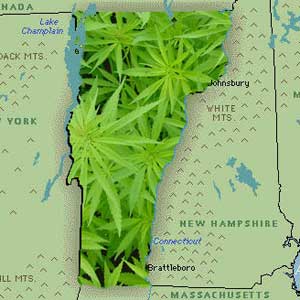 Legalizing recreational marijuana production, distribution and possession in Vermont could generate significant tax revenues, but also involves costs and important decisions about how best to regulate the substance, according to a new RAND Corporation study.
Legalizing recreational marijuana production, distribution and possession in Vermont could generate significant tax revenues, but also involves costs and important decisions about how best to regulate the substance, according to a new RAND Corporation study.
The report makes clear that if Vermont chooses to remove its prohibition on producing and selling marijuana, lawmakers will have many choices to make about who will supply it, who can buy it, if and how it will be taxed, and how it will be regulated.
The report does not make a recommendation about whether Vermont should change its marijuana laws. Researchers say the goal of the report is to inform, not sway, discussions about the future of marijuana policy in Vermont and other jurisdictions considering alternatives to traditional marijuana prohibition.
The RAND report provides the most-detailed accounting available about the wide number of issues that face state officials — in Vermont and elsewhere — when considering alternatives to traditional marijuana prohibition.
“Our conversation about whether to legalize marijuana must be rooted in facts and be transparent about the uncertainties. This RAND report will serve as a critical foundation for our ongoing discussion about the best course for Vermont,” said Vermont Gov. Peter Shumlin. “I continue to support moves to legalize marijuana in Vermont but have always said that we have to proceed with rigorous research and preparation before deciding whether to act. This report will help us do that.”
In May 2014, Shumlin signed Act 155 that required the state’s secretary of administration to produce a report about the various benefits and consequences of legalizing marijuana. The RAND report was produced for the administration in response to that legislation.
The study examines several supply models that Vermont lawmakers may wish to explore — from permitting those aged 21 and older to grow marijuana for their own use to regulating supply through nonprofit or for-profit corporations, or through a governmental entity. The report also profiles numerous marijuana regulations that could be imposed, such as a THC ceiling on products, a ban on fruit flavors and marijuana-infused candies, mandatory child-resistant packaging, age restrictions on sellers and purchasers, price floors, and a ban on self-service displays, among others.
“It is a false dichotomy to think about marijuana policy in terms of choosing either prohibition or the for-profit commercial model we see in Colorado and Washington,” said Beau Kilmer, project leader and co-director of RAND’s Drug Policy Research Center. “Jurisdictions considering alternatives to prohibition could limit supply to home production, cooperatives, nonprofit organizations, socially responsible businesses, a public authority or even a state monopoly.”
The report estimates that during 2014, Vermont residents likely consumed between 15 metric tons and 25 metric tons of marijuana, and spent between $125 million and $225 million on marijuana. RAND researchers estimate that state and local governments in Vermont now spend less than $1 million each year enforcing current marijuana laws on those aged 21 and older, while regulatory costs associated with legalizing production and retail sales of marijuana would likely exceed that level.
If Vermont legalized marijuana, taxed the product aggressively, suppressed its black market, and consumption increased, tax revenues from sales to Vermont residents could be in the tens of millions of dollars annually, according to the report.
In addition to impacts in the state, legalizing marijuana in Vermont also could have implications for neighboring states. There are nearly 40 times as many regular marijuana users living within 200 miles outside of Vermont’s borders as there are living inside Vermont, according to the report.
Vermont could therefore end up supplying large numbers of out-of-state users, directly via tourism or indirectly. This would vastly increase the potential revenue to the state, unless other states in the Northeast also legalized marijuana, researchers say. At that point, the flow of revenue to Vermont from marijuana legalization would depend on whether surrounding states imposed lower taxes, which would not only cut the revenue from out-of-state visitors but also undermine revenues from taxing Vermont’s own residents.
The report also warns that cross-border commerce could prompt a federal government response, making all revenue projections highly uncertain.
The report reviews evidence on the public health consequences of marijuana consumption and prohibition, including both the harms and the benefits. The scientific literature identifies some clear acute and chronic health effects, especially of persistent heavy marijuana use. Acute risks include accidents, impaired cognitive functioning while intoxicated, as well as anxiety, dysphoria and panic.
“There are pros and cons to all marijuana policy options, and there is tremendous uncertainty about how different forms of legalization will affect public health and safety,” said Jonathan Caulkins, a report coauthor and the Stever Professor of Operations Research and Public Policy at Carnegie Mellon University. “Much will depend on how any marijuana policy change influences the use of other substances such as tobacco, alcohol and prescription opiates.”
Longer-term risks of persistent heavy marijuana use include dependence and bronchitis. Some evidence suggests other serious risks for heavy marijuana users, particularly with psychotic symptoms, cardiovascular disease and male testicular cancers.
“While marijuana use is strongly correlated with many adverse outcomes, it is much harder to ascertain whether marijuana use causes those outcomes,” said Robert MacCoun, a report coauthor and a professor at Stanford School of Law.
For example, with respect to the ongoing debate about whether marijuana use has long-term effects on intelligence quotient, MacCoun said it is premature to argue that long-term cognitive impairment has been clearly established, but just as premature to argue that the risks are nonexistent.
RAND’s study was supported by the State of Vermont and by Good Ventures, a philanthropic foundation that makes grants in consultation with GiveWell, an organization that researches charities and advises donors.
Other authors of the report include Mark Kleiman of UCLA and BOTEC Analysis Corporation, Gregory Midgette and Rosalie Liccardo Pacula of RAND, Pat Oglesby of the Center for New Revenue, and Peter Reuter of the University of Maryland.
The report, “Considering Marijuana Legalization: Insights for Vermont and Other Jurisdictions,” is available at www.rand.org.
Since 1989, the RAND Drug Policy Research Center has conducted research to help policymakers in the United States and throughout the world address issues involving alcohol and other drugs. In doing so, the center brings an objective and data-driven perspective to an often emotional and fractious policy arena.
Source: RAND Corp


























